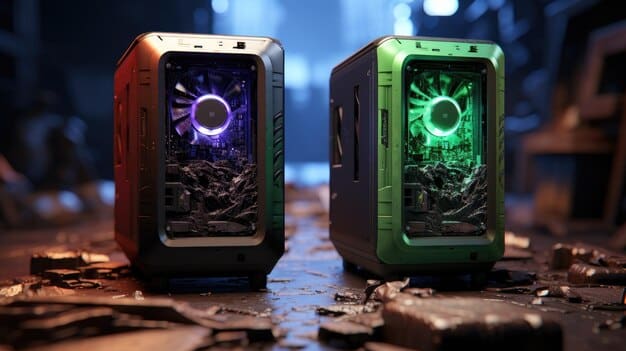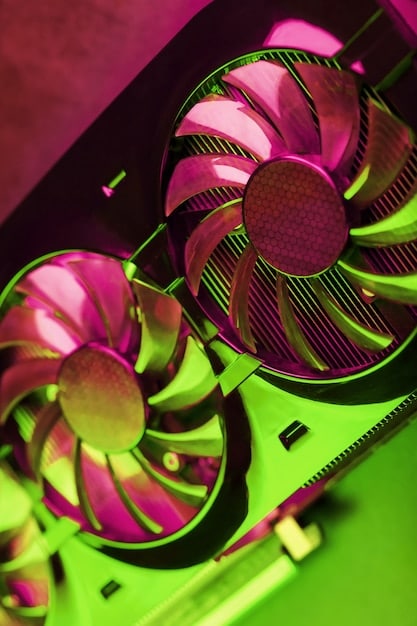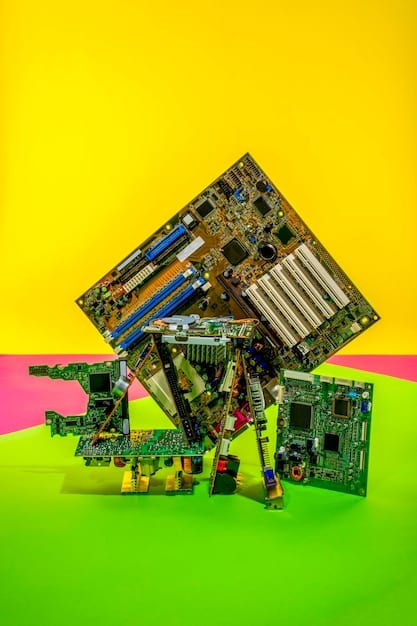Gaming Laptops vs. Desktop PCs: Your 2025 Choice

Gaming laptops and desktop PCs both offer unique advantages for gamers, making the choice between them in 2025 dependent on individual priorities such as portability, upgradeability, performance, and budget.
Choosing between gaming laptops vs. desktop PCs in 2025 is a crucial decision for gamers. Both platforms have evolved significantly, offering compelling advantages that cater to different needs and preferences. Let’s dive into a comprehensive comparison to help you make the right choice.
Gaming Laptops vs. Desktop PCs: A 2025 Overview
In the ever-evolving world of gaming, deciding between a gaming laptop and a desktop PC can be tough. Each has its own strengths, and understanding these differences is key to making the right choice. This section offers a broad overview of what you should consider when comparing these two gaming powerhouses in 2025.
Key Differences at a Glance
Gaming laptops have become increasingly powerful, offering impressive performance in a portable package. Desktop PCs, on the other hand, still hold the edge in raw power and customization. Here are some critical areas to keep in mind:
- Performance: Desktops typically offer higher performance for the same price.
- Portability: Laptops are inherently portable, allowing gaming on the go.
- Upgradeability: Desktops are much easier to upgrade than laptops.
- Price: Gaming laptops are often more expensive than comparable desktop setups.
Ultimately, the best choice depends on your lifestyle, budget, and gaming priorities. Evaluate what matters most to you before making a decision.

Performance and Specifications in 2025
When it comes to gaming, performance is king. In 2025, both gaming laptops and desktop PCs boast impressive specs, but understanding their performance nuances is essential. This section will break down what you can expect from each platform in terms of processing power, graphics capabilities, and memory performance.
CPU and GPU Performance
Desktop PCs generally offer more powerful CPUs and GPUs than their laptop counterparts for the same price. This means higher frame rates, better graphics settings, and smoother gameplay. Gaming laptops have made strides in closing this gap, but desktops still maintain a performance advantage.
Memory and Storage Considerations
Both platforms benefit from fast RAM and solid-state drives (SSDs). However, desktop PCs often have more memory slots and storage bays, allowing for greater expansion. Gaming laptops are becoming more flexible, but their upgrade options are still limited.
- RAM Speed: Higher RAM speeds can improve game loading times and overall system responsiveness.
- SSD vs. HDD: SSDs are crucial for fast boot times and game installations.
- Storage Capacity: Consider how many games and applications you plan to install.
In conclusion, while gaming laptops have improved significantly, desktop PCs still offer superior performance and greater flexibility in terms of memory and storage.
Portability and Convenience
One of the most significant advantages of gaming laptops is their portability. Being able to take your gaming setup with you wherever you go is a huge plus for many gamers. This section explores the portability aspects of gaming laptops and how they stack up against the stationary nature of desktop PCs.
Gaming on the Go
Gaming laptops allow you to play your favorite games anywhere, whether it’s at a friend’s house, on a trip, or simply in a different room. This level of convenience is unmatched by desktop PCs, which require a dedicated space and setup.
However, portability comes with tradeoffs. Gaming laptops often have shorter battery life, and their smaller screens may not provide the same immersive experience as a large desktop monitor.
Ergonomics and Setup
Desktop PCs allow for a more ergonomic setup, with the ability to use a separate monitor, keyboard, and mouse. This can lead to a more comfortable and productive gaming experience, especially for long gaming sessions.
- Screen Size: Larger monitors provide a more immersive gaming experience.
- Keyboard and Mouse: External peripherals offer better ergonomics and customization.
- Posture: A proper desk setup can improve posture and reduce strain.
Ultimately, if portability is a top priority, a gaming laptop is the clear choice. However, if you value ergonomics and a more immersive experience, a desktop PC may be a better fit.
Upgradeability and Customization Options
Desktop PCs have long been the champions of upgradeability and customization, allowing gamers to tailor their setups to their exact needs and preferences. However, gaming laptops are starting to offer some level of customization as well. This section will delve into the upgradeability and customization options available for both platforms in 2025.
Desktop PC Upgrade Paths
Desktop PCs offer unparalleled upgradeability. You can easily swap out components like the CPU, GPU, RAM, and storage to improve performance or extend the lifespan of your system. This flexibility makes desktop PCs a more future-proof investment.
Moreover, you have a wide range of customization options, from choosing the case and cooling system to selecting the specific components that meet your needs.

Laptop Upgrade Limitations
Gaming laptops typically have limited upgrade options. While you may be able to upgrade the RAM and storage, the CPU and GPU are often soldered to the motherboard, making them impossible to replace. This means that a gaming laptop’s performance is essentially fixed at the time of purchase.
- RAM Upgrades: Adding more RAM can improve multitasking and game performance.
- Storage Upgrades: Replacing the HDD with an SSD can significantly improve load times.
- External Peripherals: Using external keyboards, mice, and monitors can enhance the gaming experience.
In conclusion, if upgradeability and customization are important to you, a desktop PC is the clear winner. Gaming laptops offer some limited upgrade options, but they cannot match the flexibility of a desktop PC.
Cost Analysis: Budgeting for Your Gaming Rig
Budget is a major factor when choosing between a gaming laptop and a desktop PC. In general, gaming laptops are more expensive than comparable desktop setups. This section provides a detailed cost analysis, helping you understand the expenses associated with each platform.
Initial Purchase Price
Gaming laptops typically cost more than desktop PCs with similar specifications. This is due to the miniaturization and engineering required to pack high-performance components into a portable package.
When budgeting, consider the cost of the laptop itself, as well as any necessary accessories like a gaming mouse, headset, and external monitor.
Long-Term Costs
While the initial purchase price of a desktop PC may be lower, you also need to factor in the cost of peripherals like a monitor, keyboard, and mouse. Additionally, you may need to upgrade components over time to keep up with the latest games.
- Component Upgrades: Replacing the GPU or CPU can significantly improve performance.
- Peripheral Costs: High-quality monitors, keyboards, and mice can enhance the gaming experience.
- Maintenance: Regular cleaning and maintenance can extend the lifespan of your system.
Ultimately, the best way to determine which platform is more cost-effective is to create a detailed budget that takes into account both the initial purchase price and long-term costs.
The Evolving Landscape: Gaming in 2025 and Beyond
The world of gaming technology is constantly evolving, and both gaming laptops and desktop PCs are expected to continue to improve in the coming years. This section explores the trends and predictions for the future of gaming hardware, helping you make an informed decision about your next gaming rig.
Technological Advancements
Both gaming laptops and desktop PCs are benefiting from advancements in CPU and GPU technology, as well as improvements in memory and storage. These advancements are leading to faster performance, better graphics, and more immersive gaming experiences.
The Rise of Cloud Gaming
Cloud gaming services like GeForce Now and Xbox Cloud Gaming are becoming increasingly popular, allowing gamers to stream games to a variety of devices without the need for high-end hardware. While cloud gaming is still in its early stages, it has the potential to revolutionize the way we play games.
- Lower Hardware Requirements: Cloud gaming eliminates the need for expensive gaming hardware.
- Accessibility: Games can be played on a variety of devices, including laptops, tablets, and smartphones.
- Subscription Fees: Cloud gaming services typically require a monthly subscription fee.
In conclusion, the future of gaming is likely to involve a combination of local hardware and cloud-based services. Whether you choose a gaming laptop or a desktop PC, it’s important to stay informed about the latest technological advancements and trends.
| Key Aspect | Brief Description |
|---|---|
| 💻 Portability | Laptops offer gaming on the go, desktops are stationary. |
| 💪 Performance | Desktops generally provide more power for the same price. |
| 🔧 Upgradeability | Desktops are easier to upgrade and customize. |
| 💰 Cost | Laptops tend to be pricier than desktops with similar specs. |
Frequently Asked Questions
▼
While laptops are improving, desktops are likely to maintain a performance edge due to better cooling and power availability. However, the gap is narrowing.
▼
Generally, building a gaming desktop offers more performance per dollar than buying a gaming laptop. Laptops include portability costs.
▼
Upgrading every 2-3 years ensures your system can run the latest games smoothly. Focus on the GPU for the most significant performance boost.
▼
Yes, connect a gaming laptop to an external monitor, keyboard, and mouse for a desktop-like experience. Ensure adequate cooling for prolonged use.
▼
Cloud gaming allows playing games on lower-end hardware without needing expensive upgrades. It provides accessibility across various devices.
Conclusion
Choosing between a gaming laptop and a desktop PC in 2025 depends largely on your individual needs. If portability and convenience are paramount, a gaming laptop is the way to go. However, if you prioritize performance, upgradeability, and cost-effectiveness, a desktop PC remains the superior choice. Considering the factors outlined above will guide you towards the best gaming experience for your unique requirements.





